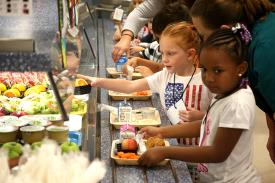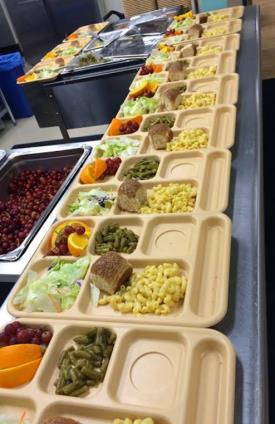 The School Nutrition Association has quantified the impact of COVID on school districts as a result of COVID at $483 million. Over 70 percent of school districts anticipate losses for the 2019-2020 school year and will extend through the succeeding year. Observers expect long-term consequences for school feeding including the critical provision of food for low-income children. During March and April schools collectively lost 400 million meals compared to the corresponding months in 2019 as determined by the Government Accountability Office.
The School Nutrition Association has quantified the impact of COVID on school districts as a result of COVID at $483 million. Over 70 percent of school districts anticipate losses for the 2019-2020 school year and will extend through the succeeding year. Observers expect long-term consequences for school feeding including the critical provision of food for low-income children. During March and April schools collectively lost 400 million meals compared to the corresponding months in 2019 as determined by the Government Accountability Office.
 Reggie Ross, President of the School Nutrition Association is urging Congress to make funds available to continue feeding children both in school and through extracurricular programs. The Heroes Act 2.0 includes a $175 billion coronavirus aid for K-12 schools including $5 billion for safety measures including PPE and modifications to ventilation systems in cafeterias and kitchens. The bill passed by the House includes reimbursement for 55 percent of the cost associated with school nutrition during the 2019-2020 academic year. Ross was quoted as "we urge the Senate to pass Heroes Act 2.0 providing desperately needed emergency relief funds for school meal programs to support America students".
Reggie Ross, President of the School Nutrition Association is urging Congress to make funds available to continue feeding children both in school and through extracurricular programs. The Heroes Act 2.0 includes a $175 billion coronavirus aid for K-12 schools including $5 billion for safety measures including PPE and modifications to ventilation systems in cafeterias and kitchens. The bill passed by the House includes reimbursement for 55 percent of the cost associated with school nutrition during the 2019-2020 academic year. Ross was quoted as "we urge the Senate to pass Heroes Act 2.0 providing desperately needed emergency relief funds for school meal programs to support America students".
Katie Wilson of the Urban School Food Alliance, a non-profit representing the largest school districts stated, "major districts have loss significantly and continue to lose money as they try a variety of ideas to increase participation rates and bring families back to pick up their meals". She added, "without government action districts are bracing for the worst and many don’t know what the future holds". She rhetorically asked, "how do you continue to cut into a program that is underfunded to start with?"
In a related matter, the USDA announced a continued extension of flexibilities with regard to school feeding that allows free school meals through the entire 2020-2021 school year. This is essentially a stop-gap measure that does not reimburse school districts for additional expenses associated with COVID prevention measures.
Against this backdrop the AEB is continuing to promote eggs in various presentations for school meals. In times of financial stringency the inherent nutritional qualities of eggs and the provision of nutrients at minimal cost presumes more servings of our product.